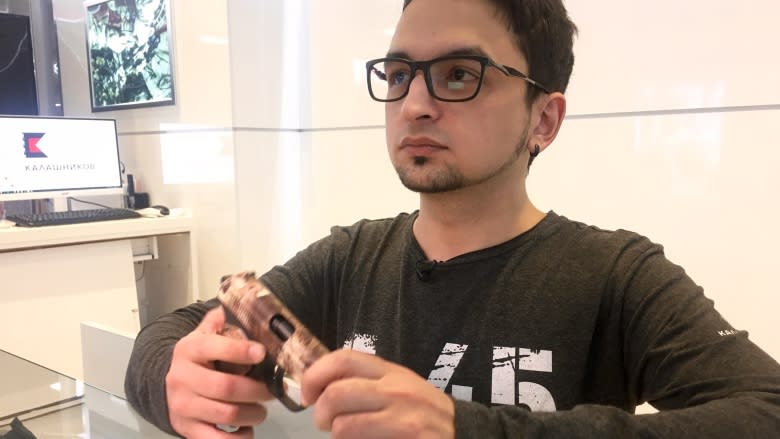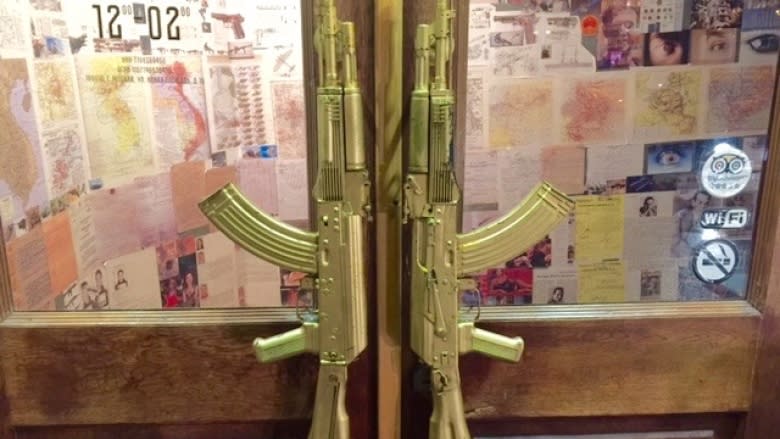Russian maker of AK-47 shrugs off Canada-U.S. sanctions as sales grow
It may be the only place in the world that will sell you guns at the airport instead of taking them away.
Travellers killing time at Moscow's Sheremetyevo airport are curious as they duck into a shop with a gun rack on the wall and a cabinet full of pistols near the cash register.
Next to that are racks of kids' T-shirts printed with "I Love AK."
That's AK-47, the famed Russian rapid-fire assault rifle that has made its manufacturer, Kalashnikov, a worldwide name.
"Why not? I think it's a good thing from Russia, good souvenir," says Artyom Baranowsky, manager of the first Kalashnikov concept store in Russia.
Opened last summer, it sells Kalashnikov-branded products ranging from cellphone cases to bullet-shaped thermoses to mock rifles and pistols. They're actual Kalashnikov weapons you can assemble and disassemble; some shoot low-power plastic pellets, others can't shoot at all. The store's not allowed to sell ammunition.
For Russians, the Kalashnikov is not just a brand, says Baranowsky. "It's something in the legacy of every man in Russia. The Kalashnikov is Russia, and Russia is the Kalashnikov."
A symbol of power, described by the average Russian as a weapon used to protect freedom, to make peace, not war, regardless of its deadly legacy.
Baranowsky says he sells at least a pistol a day. He records the passport number of the customer, who's required to put the item in their checked luggage.
Impact of sanctions was 'drastic' at first
The store is one way Kalashnikov Concern is branching out to stay alive.
The company was caught up in sanctions slapped on Russia by the U.S. and Canada in 2014, after Russia annexed Crimea. Canada barred any business or trade with Kalashnikov Concern and added its CEO to a list of individuals banned from entering Canada.
The U.S. had been the company's biggest market, so the impact of sanctions was "drastic" at first as exports plummeted by nearly half, according to deputy CEO of sales and marketing Vladimir Dmitriev.
"As long as you are being cut from one of the most profitable and prosperous markets, you have to find some other strategy," he told CBC News at Kalashnikov's corporate offices in Moscow. "We found that answer in the diversification of the business itself."
Dmitriev says export volume has now nearly doubled again, with new customers in 30 countries that do not support the sanctions. The factory in Izhevsk is hiring 1,700 additional staff.
"A few years ago, it looked like Stalingrad," Dmitriev says, referring to the city nearly destroyed in a Second World War battle.
But now the 200-year-old gun factory is being totally rebuilt to contemporary standards. In 2014 the arms maker was reorganized into a public-private company (Concern), with 51 per cent being held by the state-owned Rostec, and 49 per cent held in private hands.
Kalashnikov is producing a modern AK for civilian use, due out later this year, with a military version to follow. It acquired a controlling stake in a company that makes unmanned aerial systems (drones) and another stake in a company that makes assault landing boats. Its Baikal brand makes hunting weapons and apparel. Kalashnikov has found new, ready markets, particularly in the Middle East, where it could build a new factory.
"It's a rapid expansion for us — not only the width of products we are supplying but the quality of operations, and the sales model as well," Dmitriev says.
'It's a very famous gun'
The AK-47 assault rifle was developed in 1947 by Red Army soldier Mikhail Kalashnikov. Easier to use and more durable than its rivals, the AK (Avtomat Kalashnikov) was rapidly pumped out in factories in the former Soviet republics.
As new models were released in the 1970s, older AK models, still operational, were passed down the arms chain so that an estimated 60-100 million are still spread around battlefields and urban warfare zones, in the hands of mercenaries, insurgents and terrorists, as well as soldiers.
That this gun carries mythic status in Russia is obvious.
A central Moscow bar called Razvetka, or "intelligence service," located directly across the street from FSB headquarters, sports two AK-47's cast in metal as its door handles.
A 19th-century brewery built a live shooting gallery deep in its cellar where customers can try their hand at operating a Kalashnikov.
Manager Igor Fedyukin says since it opened 18 months ago, the place is attracting Russians but also tourists from around the world, including from Canada.
"It's a very famous gun, because of computer games and movies — Counter-Strike, Call of Duty," Fedyukin says. "People are interested in how easy or how difficult it is to shoot a real Kalashnikov."
The brand is even extending its reach into the U.S., where a Florida company has plans to manufacture a new Kalashnikov "Alfa" model beginning this year. Kalashnikov USA has licensing rights from the Russian arms maker, and will produce American-made assault rifles for the lucrative American market, getting around the import ban.
Marketing the Kalashnikov name is proving to be an economic generator for the legendary Russian company.
"Kalashnikov is not just a small arms manufacturer anymore," says Dmitriev.
"We're trying to conquer some areas where we weren't present before" he says, leaving unsaid the obvious conclusion that western sanctions, far from hurting Kalashnikov Concern, have reinvigorated the company, forcing it to refocus and push into new markets eager to buy up its brand.
"We're still the good old Russian guys producing the good old Kalashnikovs, but now we are technologically profound."
And savvy marketers. Kalashnikov concept stores are planned for other Russian cities and beyond.






